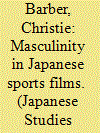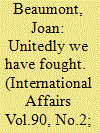| Srl | Item |
| 1 |
ID:
133469


|
|
|
|
|
| Publication |
2014.
|
| Summary/Abstract |
This paper considers three recent Japanese sports films for young people, Feel the Wind (2009), Oppai Volleyball (2009) and Dive!! (2008), which employ a common sports film script to explore the ways in which masculinity is constructed, expressed and evaluated through participation in sport. Through depictions of masculinities that achieve subjective agency and acceptance by peers despite a lack of competence or victory in sport, these films disrupt the established relationship between masculinity, competence and dominance, and endorse non-normative models of masculinity. They also reflect the tensions between a desire for agency, social constraints and expectations, and the dominant ideology of masculinity. In so doing, they help to illuminate the ways in which gender is negotiated in relation to contemporary social and political conditions.
|
|
|
|
|
|
|
|
|
|
|
|
|
|
|
|
| 2 |
ID:
131432


|
|
|
|
|
| Publication |
2014.
|
| Summary/Abstract |
This article examines what motivated the dominions to make such a sustained and costly contribution to the war effort of the British empire during the First World War. With particular reference to Australia, it argues that imperial loyalty, now discounted as anachronistic, was the dominant ideology. Not only did it inspire the initial generous support for the British war effort but, for many Australians, the empire's cause invested with meaning the battle losses which were proportionately the highest of any dominion army. The Gallipoli campaign of 1915 is now celebrated as having given birth to the foundational narrative of the young Australian nation, but at the time this embryonic nationalism too was positioned within the framework of imperial loyalty. Moreover, with the conservative forces dominating federal politics after the divisive debates about conscription in 1916 and 1917, 'loyalty' became entrenched as the litmus test of political reliability. Hence, while Australia's Prime Minister W. M. (Billy) Hughes aggressively asserted the rights of the dominions to a new and more independent role within the imperial relationship in 1918 and 1919, this agenda for change found little support at home. It is therefore ahistorical to see the First World War as the birth of Australian nationalism in the sense that the term is understood today. Rather, imperial loyalty was affirmed by the British victory as the dominant ideology and proved able to accommodate the growing sense of national singularity that the war fuelled.
|
|
|
|
|
|
|
|
|
|
|
|
|
|
|
|
| 3 |
ID:
132060


|
|
|